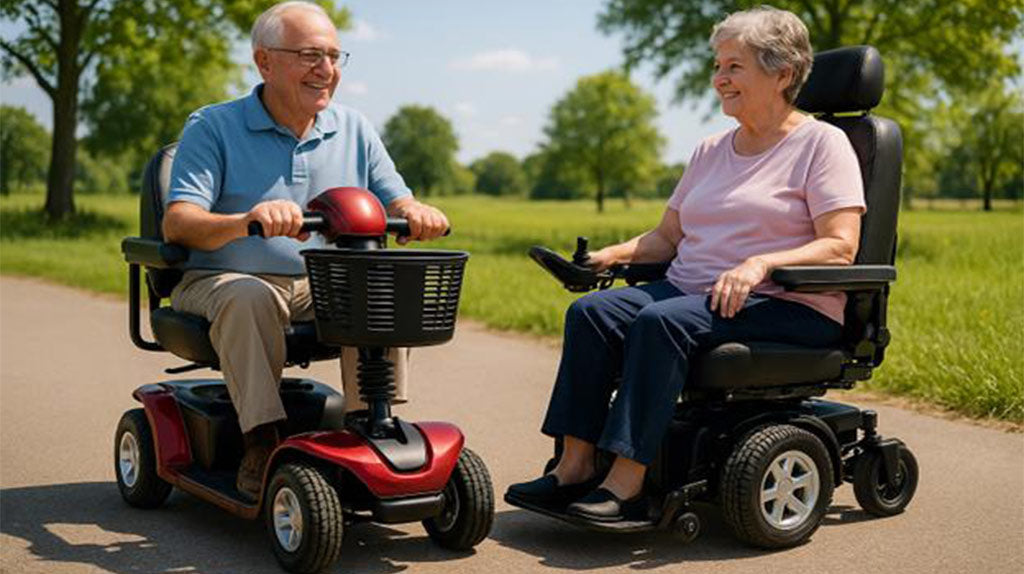Categories
- Home
- Our Products
- Rentals
- About Us
- Return/Refund Policy
- Contact Us
Recent Articles

Mobility Scooters vs. Power Wheelchairs: Which is Right for Your Lifestyle?
Let’s face it—mobility isn’t just about getting from point A to point B. It’s about freedom, independence, and living life on your terms. So, if you or a loved one is looking for a little help getting around, you’ve probably found yourself deep in the rabbit hole of: “Should I get a mobility scooter or a power wheelchair?”
Both options are excellent. Both are built to help you move with ease. But they serve different lifestyles, needs, and personalities. (Yes, your personality counts when you’re choosing your wheels.) So, let’s break it down—casually, honestly, and without all the robotic jargon.
First, What’s the Difference?
You’d be surprised how many people are googling this one, so let’s clear it up.
Mobility scooters are designed for individuals who can walk short distances but need assistance over longer stretches. Think of them as the convertible of the mobility world—stylish, comfortable, and perfect for cruising the mall, grocery store, or neighbourhood sidewalk.
Power wheelchairs, on the other hand, are built for individuals who need full-time mobility assistance. They’re like the trusty 4x4 SUV—sturdy, manoeuvrable, and designed to handle indoor and outdoor terrain with grace.
Key Questions to Ask Yourself
 Let’s get personal. Choosing between a mobility scooter and a power wheelchair isn’t about which one looks cooler. It’s about how you live.
Let’s get personal. Choosing between a mobility scooter and a power wheelchair isn’t about which one looks cooler. It’s about how you live.
1. How much mobility do you have?
Do you have enough strength and balance to stand or walk short distances, say, around the house or from your car to the front door? If yes, you might be more comfortable with a scooter. But if walking is a struggle or you rely on full-time seated mobility, a power wheelchair will give you the support you need.
2. Where will you be using it most?
If you’re out and about—doing errands, exploring your neighbourhood, or hitting the local farmers market—a scooter’s longer battery life and higher speeds will come in handy. But if you’re mostly indoors (navigating tight hallways, turning into doorways), you’ll appreciate the tighter turning radius of a power wheelchair. That thing can practically be pirouette.
3. What’s your posture like?
Power wheelchairs offer more advanced seating and positioning options. If you need headrests, tilt functions, or extra lumbar support, you’re in power chair territory. Scooters are comfy, yes, but they’re more casual—less about posture more about portability.
4. Do you travel a lot?
Mobility scooters can often be disassembled and fit in the trunk of a car. If you’re hopping in and out of vehicles frequently, that might be a deciding factor. Power wheelchairs are heavier and often require a lift or van modification. It’s worth it if you’re staying put, but maybe it’s not ideal for the spontaneous jet-setter.
Pros & Cons (Because You Know You Wanted a List)
Mobility Scooter Pros:
- Great for outdoor use and long distances
- Simple to operate
- Often more affordable
- Sleek and stylish designs
Mobility Scooter Cons:
- It is not ideal for indoor manoeuvring
- Fewer custom seating options
- Requires more upper body mobility
Power Wheelchair Pros:
- Excellent for indoor and outdoor use
- Tight turning radius (hello, tiny apartment!)
- Customizable support and controls
- Best for full-time use
Power Wheelchair Cons:
- Heavier and less portable
- Pricier
- It may require special transport equipment
Common Questions People Ask (And You Might Be Wondering Too)
Can I use a mobility scooter inside my home?
You can, but it depends on your home layout. Scooters have a wider turning radius, which can make manoeuvring in tight spaces tricky. Open floor plans? You’re golden. Tiny bathroom doors? Not so much.
Does insurance cover power wheelchairs?
In many cases, yes—especially if a doctor deems it medically necessary. But you’ll need to check with your insurance provider and potentially provide documentation. (Pro tip: Rio Medical Supplies can help guide you through this process.)
How long do batteries last on each?
Most scooters can go about 10–20 miles on a full charge. Power wheelchairs offer slightly less—often around 8–15 miles—but it depends on the model, terrain, and weight capacity.
So… Which Should You Choose?
If you’re looking for a part-time mobility buddy for errands and outings and you’ve got decent upper body strength, a mobility scooter might be your perfect match.
But if you need full-time support, tighter turning, and comfort that adjusts to your needs, then the power wheelchair is the better fit.
Either way, it’s not just about what you ride—it’s about how you live. You deserve mobility equipment that keeps up with your lifestyle, supports your health, and empowers your independence.
Ready to Roll?
At Rio Medical Supplies, we don’t believe in one-size-fits-all. Our expert team is here to help you choose the right mobility solution for your life—not someone else’s. Whether you’re eyeing that zippy scooter or leaning toward a reliable power wheelchair, we’ve got you covered with high-quality, affordable options and compassionate service that goes the extra mile (literally).
Visit us today—online or at our Greater Washington D.C. location—and let’s get you moving in the right direction.
References and Resources
- a mobility scooter or a power wheelchair, Best mobility aid for seniors, choosing a mobility device for lifestyle, difference between a mobility scooter and a power wheelchair, electric wheelchair vs mobility scooter, how to choose between a power wheelchair and scooter, lightweight power wheelchair vs scooter, mobility aids comparison, mobility scooter for travel, mobility scooter or power wheelchair for the elderly, mobility scooter vs electric wheelchair for disabled, Mobility scooters vs. power wheelchairs., portable mobility scooter vs wheelchair, power chair vs scooter for outdoor use, power wheelchair for indoor use, pros and cons of mobility scooters, which is better
